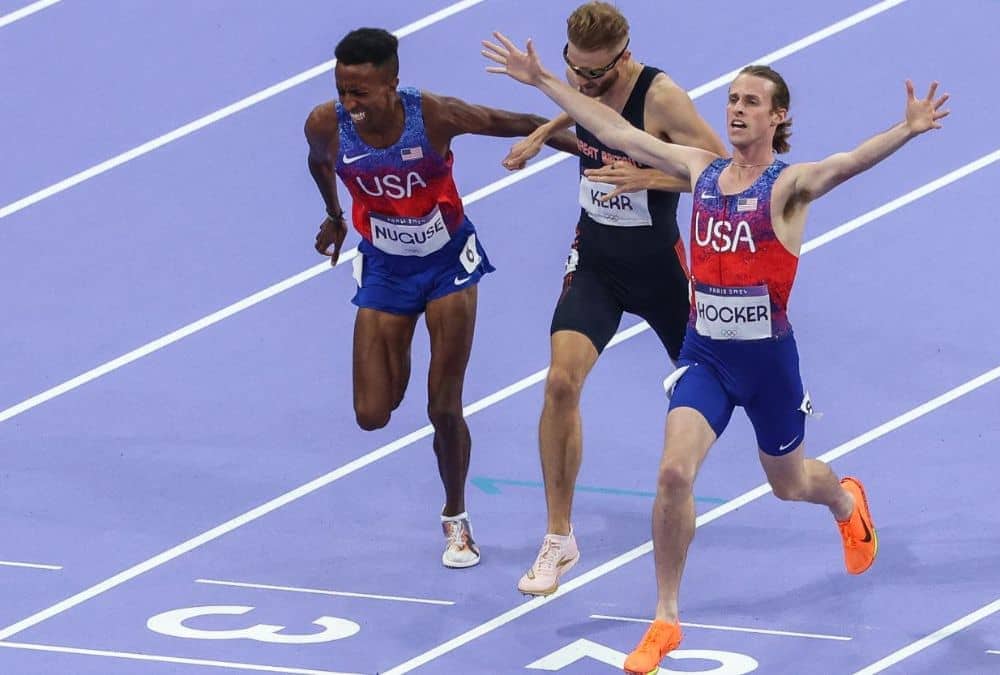The Paris 2024 men’s Olympic 1500 metres was preceded by a bucketful of talk, some of it maybe contrived, but all of it setting the scene for an epic showdown between defending champion Jakob Ingebrigtsen and the man who beat him for last year’s world championship, Josh Kerr.
As they went to the line, the commentator on my television was calling it the greatest rivalry since Coe and Ovett. In a life before he became president of World Athletics, Sebastian Coe shared a fierce rivalry with fellow-Brit Steve Ovett. Their meeting in the Moscow 1980 Olympic final was a battle in two. Everyone knew it. Everyone expected it.
It was an epic, too. Coe, who had lost the 800 to Ovett a few days earlier, redeemed himself with the gold medal. But the race was so nearly upstaged by Jurgen Straub, the East German runner who beat Ovett for the silver medal.
In another epic Olympic final in the Stade de France, Cole Hocker went one better than Straub. He snuck through with an inside run along the final straight to ambush Kerr just after Kerr had got past Ingebrigsten and was seemingly heading to victory.
As the final unfolded the way we all expected it would, Ingebrigtsen throwing the gauntlet down from the gun with 54.82, 1:51.30 and 2:47.27 intermediate splits, Kerr stalking him (along with Timothy Cheruiyot and Brian Komen for 800), Kerr striking off the final bend, Hockey and his US teammate Yared Nuguse were improving their positions almost step-by-step.
Kerr took closer order at the 1200. Hocker moved to third along the back-straight, Nuguse moving with him. Around the final bend the two favourites raced. Then, just as he had in Budapest last year, Kerr got to, and past, Ingebrigtsen. It looked all over – until Hocker came through on the inside with astonishing swiftness. Hocker went to the line in 3:27.65, taking Ingebrigtsen’s Olympic record along with the gold medal.
A stunned Kerr barely held off Nuguse for the silver, 3:27.79 to 3:27.80. Ingebrigetsen went from first to fourth in less than 100 metres. He set up arguably the greatest Olympic final of all-time but walked away without a medal. Not the least ‘rule’ of middle-distance running shattered was 1976 champion John Walker’s observation that no man who had led an Olympic 1500 final into the final straight had failed to win the gold medal.
It may be a harsh judgement, but Ingebrigtsen perhaps should have seen this coming. The Tokyo champion has now run much the same race in three successive championships and lost all three. In Eugene it was Jake Wightman who jumped him in the final 100; in Budapest Kerr outraced him off the final bend. He did so again in Paris, only for Hocker to beat both men.
But we all should have seen it coming. As Kerr and Ingebrigtsen lit up the track world firing barbs at each other, the Americans were coming. At the US Trials, Hocker led home a remarkable show of force, winning championship race in 3:30.59 from Nuguse, 3:30.86, and Hobbs Kessler – fifth in the Olympic final – 3:31.53.
Perhaps we went more on Hocker’s seventh behind Kerr in the mile at the Prefontaine Classic. But he had also run the national cross-country championship at year’s start and a sub-13 for 5000 in June. His endurance was there for all to see and his race in the Trials showed he was ready for something big.
In the Olympic final, when it mattered most, Hocker delivered in spades. Jurgen Straub upstaged one of the big two. Hocker got them both.
Two of the past three men’s Olympic champions have now come from the US. What contrasting victories they were: Hocker ran the fastest ever Olympic race, Matt Centrowitz won in Rio eight years earlier in the slowest winning time since 1932.
There was another gold for the US on the night. Gabby Thomas, silver medallist behind Shericka Jackson in Budapest, stepped up a place to take the 200 in 21.83 seconds. The 100 gold medallist Julien Alfred was expected to challenge but Thomas was in the lead once they straightened and held her form all the way to the line.
Alfred made it a gold and silver double, crossing the line in 22.08. Just as in the men’s 1500, Brittany Brown made it gold and bronze for the US, taking third in 22.20.
World record holder Beatrice Chepkoech who has been in the doldrums in recent years, made a bold attempt to run away with the 3000 steeple, going through the first 1000 metres close to world record pace in 2:56.
Defending champion Peruth Chemutai was next to show at the front, taking over with three laps to run. In the end, however, it was Budapest world champion Winfred Yavi who proved the strongest, adding an Olympic gold to her world gold in an Olympic record 8:52.76. Chemutai took silver in 8:53.34, a personal best and national record, and Faith Cherotich, just a few weeks past her twentieth birthday, took bronze in 8:55.15.
And Greece, birthplace of the modern Olympics, celebrated Miltiadis Tentoglou to savour in the long jump. He won the gold with a best jump of 8.48 from Jamaica’s Wayne Pinnock, 8.36, and Mattia Furlani of Italy, 8.34.
Didn’t notice too many fans, certainly not Greeks, anyway, calling for the introduction of the metre-takeoff zone. Not that they had reason to: Tentoglou’s only foul came on his last jump, an all-out effort for distance after he had the gold medal safely in his possession.
